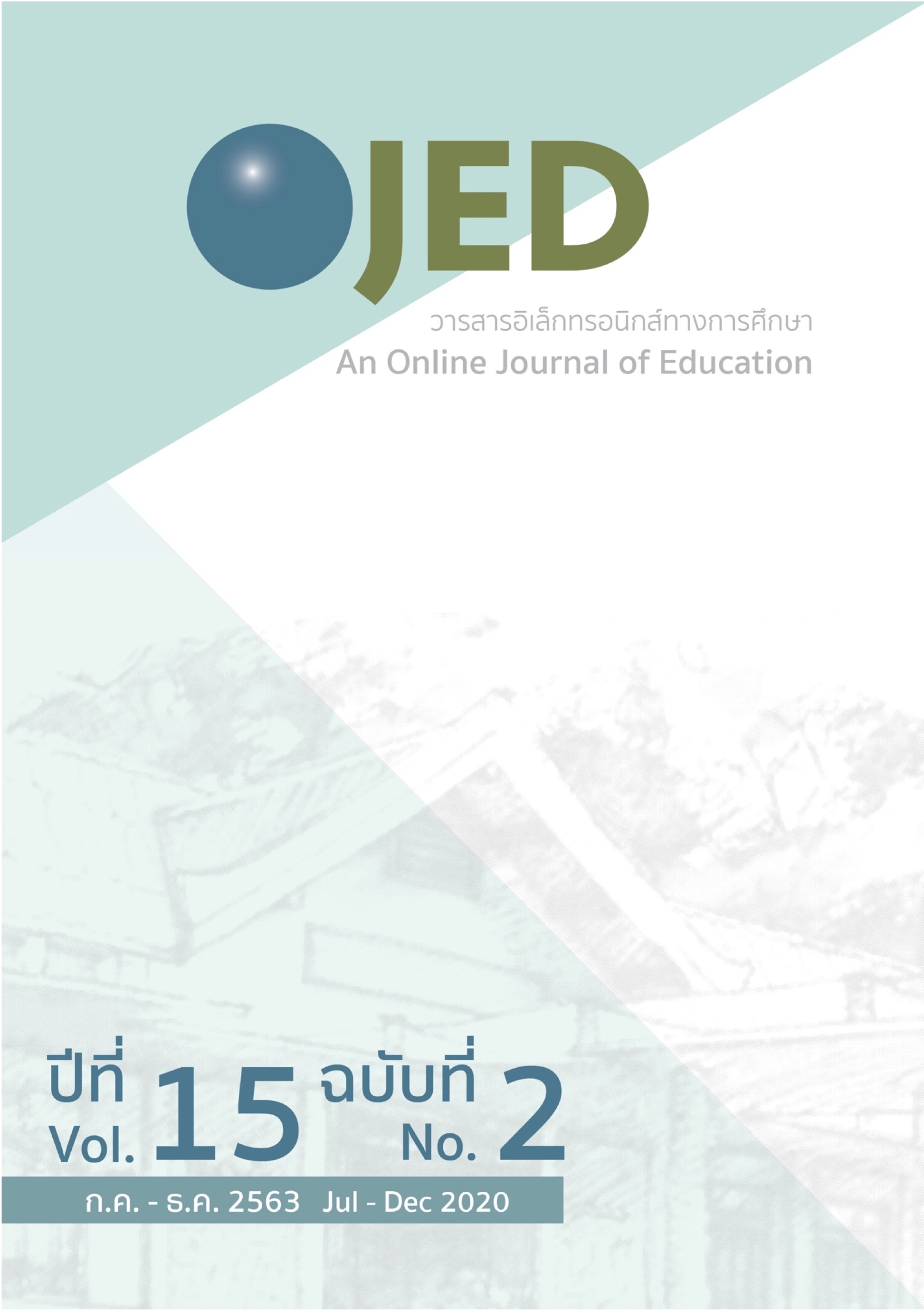Development of a Conceptual Framework for Influencing Authentic Leadership of School Administrators Affecting the Organizational Citizenship Behavior of Teachers
DOI:
https://doi.org/10.14456/ojed.2020.52Keywords:
authentic leadership, organizational citizenship behavior, school leadershipAbstract
This paper aims to review related literature in order to set up research hypotheses and propose a conceptual framework for influencing authentic leadership of school administrators on organizational citizenship behavior of teachers. The study utilizes content analysis. Based on literature review, the study identifies that an authentic leader positively impacts some desirable characteristics of his or her followers. Therefore, we hypothesize that a school principal who has authentic leadership can influence teachers’ organizational citizenship behavior. This conceptual framework may be used for further research to test the hypothesis.
References
ธีรภัทร กุโลภาส. (2556). อิทธิพลของภาวะผู้นำที่แท้จริงที่มีต่อผลสัมฤทธิ์ทางการเรียนของนักเรียนโดยมีการมองโลกเชิงบวกทางวิชาการและความยึดมั่นผูกพันของครูเป็นตัวแปรส่งผ่านและขนาดโรงเรียนเป็นตัวแปรปรับ: วิจัยแบบผสมวิธี. [วิทยานิพนธ์ปริญญาดุษฎีบัณฑิต]. Chulalongkorn University Intellectual Repository (CUIR). http://cuir.car.chula.ac.th/handle/123456789/42994
วิมลรัตน์ ครองมงคล และศยามล เอกะกุลานันต์. (2555). ภาวะผู้นำ บรรยากาศองค์การ และพฤติกรรมการเป็นสมาชิกที่ดีขององค์การที่ส่งผลต่อผลการปฏิบัติงานของข้าราชการหน่วยงานราชการแห่งหนึ่ง. วารสาร สังคมศาสตร์ และ มนุษยศาสตร์ (Journal of Social Sciences and Humanities), 38(1), 214-227.
สันติ บูรณะชาติ. (2558). การบริหารสถานศึกษาด้วยภาวะผู้นำที่แท้จริง. วารสารศึกษาศาสตร์มหาวิทยาลัยบูรพา, 26(3), 1-13.
Barnard, C. I. (1968). The functions of the executive (Vol. 11). Harvard university press.
Bateman, T. S., & Organ, D. W. (1983). Job satisfaction and the good soldier: The relationship between affect and employee “citizenship”. Academy of Management Journal, 26(4), 587-595. https://doi.org/10.5465/255908
Clapp-Smith, R., Vogelgesang, G. R., & Avey, J. B. (2009). Authentic leadership and positive psychological capital: The mediating role of trust at the group level of analysis. Journal of Leadership & Organizational Studies, 15(3), 227-240. https://doi.org/10.1177/1548051808326596
Gardner, W. L., Avolio, B. J., Luthans, F., May, D. R., & Walumbwa, F. (2005). Can you see the real me?: A self-based model of authentic leader and follower development. Leadership Quarterly, 16(3), 343-372. https://doi.org/10.1016/j.leaqua.2005.03.003
George, B. (2003). Authentic leadership: Rediscovering the secrets to creating lasting value. John Wiley & Sons.
George, B., Sims, P., McLean, A. N., & Mayer, D. (2007). Discovering your authentic leadership. Harvard Business Review, 85(2), 1-9.
Ilies, R., Morgeson, F. P., & Nahrgang, J. D. (2005). Authentic leadership and eudaemonic well-being: Understanding leader–follower outcomes. The Leadership Quarterly, 16(3), 373-394. https://doi.org/10.1016/j.leaqua.2005.03.002
Jahangir, N., Akbar, M. M., & Haq, M. (2004). Organizational citizenship behavior: Its nature and antecedents, 1(2), 75-85.
Katz, D. (1964).The motivational basis of organizational behavior. Systems Research and Behavioral Science, 9(2), 131-146. https://doi.org/10.1002/bs.3830090206
Katz, D., & Kahn, R. L. (1978). The social psychology of organizations (Vol. 2). Wiley.
Kernis, M. H. (2003). Optimal self-esteem and authenticity: Separating fantasy from reality-author's response. Psychological Inquiry, 14(1), 83-89. https://doi.org/10.1207/S15327965PLI1401_03
Mayer, R. C., & Gavin, M. B. (2005). Trust in management and performance: Who minds the shop while the employees watch the boss?. Academy of Management Journal, 48(5), 874-888. https://doi.org/10.5465/amj.2005.18803928
Organ, D. W. (1988). Organizational citizenship behavior: The good soldier syndrome. Lexington Books/D. C. Heath and Com.
Organ, D. W., & Konovsky, M. (1989). Cognitive versus affective determinants of organizational citizenship behavior. Journal of Applied Psychology, 74(1), 157.
Organ, D. W., Podsakoff, P. M., & MacKenzie, S. B. (2005). Organizational citizenship behavior: Its nature, antecedents, and consequences. Sage Publications.
Podsakoff, N. P., Whiting, S. W., Podsakoff, P. M., & Blume, B. D. (2009). Individual-and organizational-Level consequences of organizational citizenship behaviors: A meta-analysis. Journal of Applied Psychology, 94(1), 122-141.
https://doi.org/10.1037/a0013079
Podsakoff, P. M., MacKenzie, S. B., Paine, J. B., & Bachrach, D. G. (2000). Organizational citizenship behaviors: A critical review of the theoretical and empirical literature and suggestions for future research. Journal of Management, 26(3), 513-563.
https://doi.org/10.1016/S0149-2063(00)00047-7
Rogers, C. R. (1963). Actualizing tendency in relation to "Motives" and to consciousness. In M. R. Jones (Ed.), Nebraska symposium on motivation (p. 1–24). U. Nebraska Press.
Rost, J. C. (1993). Leadership for the twenty-first century: Greenwood Publishing Group.
Sinclair, A. (2010). Placing self: How might we place ourselves in leadership studies differently?. Leadership, 6(4), 447-460. https://doi.org/10.1177/1742715010379312
Smith, C., Organ, D. W., & Near, J. P. (1983). Organizational citizenship behavior: Its nature and antecedents. Journal of Applied Psychology, 68(4), 653-663. https://doi.org/10.1037/0021-9010.68.4.653
Tambe, S. (2014). A study of organizational citizenship behaviour (OCB) and its dimensions: A literature review. International Research Journal of Business and Management, 1, 67-73.
Walumbwa, F. O., Avolio, B. J., Gardner, W. L., Wernsing, T. S., & Peterson, S. J. (2008). Authentic leadership: Development and validation of a theory-based measure. Journal of Management, 34(1), 89-126. https://doi.org/10.1177/0149206307308913
Walumbwa, F. O., Wang, P., Wang, H., Schaubroeck, J., & Avolio, B. J. (2010). Psychological processes linking authentic leadership to follower behaviors (Retracted article. See vol. 25, pg. 1071, 2014). Leadership Quarterly, 21(5), 901-914. https://doi.org/10.1016/j.leaqua.2010.07.015
Walz, S. M., & Niehoff, B. P. (2000). Organizational citizenship behaviors: Their relationship to organizational effectiveness. Journal of Hospitality & Tourism Research, 24(3), 301-319. https://doi.org/10.1177/109634800002400301
Wang, H., Sui, Y., Luthans, F., Wang, D. N., & Wu, Y. H. (2014). Impact of authentic leadership on performance: Role of followers' positive psychological capital and relational processes. Journal of Organizational Behavior, 35(1), 5-21. https://doi.org/10.1002/job.1850
Downloads
Published
How to Cite
Issue
Section
License

This work is licensed under a Creative Commons Attribution-NonCommercial-NoDerivatives 4.0 International License.




